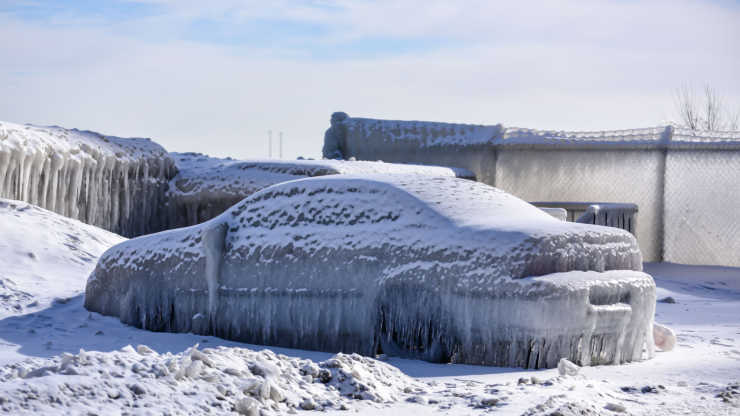Hundreds of thousands of people are out of power in Michigan right now, with cold temperatures bearing down on them. Many of them won’t have power back until Sunday. The Detroit Free Press reports:
When will the lights come on again?
Utility crews in Michigan are working to restore power to hundreds of thousands of customers in Michigan. Yet, the totals hardly seemed to change with DTE reporting early Friday morning more than 460,000 customers still in the dark. Consumers Energy’s totals didn’t fare much much better, falling slightly to more than 175,000.
One problem, Trevor Lauer, the president of DTE Electric, said Friday during an early morning news conference, as fast as they could put power lines back up, more came down. On top of the 500,000 customers who lost their electricity during the storm, on Thursday, another 100,000 also lost power.
Both companies — the state’s two largest utilities — have said they expect most of their customers will have power back sometime Sunday. That’s if the weather cooperates, and so far, that hasn’t been the case. But, weather forecasters said, they may finally my catch a break this weekend, when it is expected to warm up.
“As we get into the field today, we’re going to continue to work on understanding just how much damage exists in the infrastructure,” Lauer said. “There’s areas that were hit particularly hard, especially in Washtenaw County and Livingston County. That’s where we’re seeing the most extensive damage, where we had the heaviest ice.”
What can you do if you are one of 700,000 people out of power in your area? If you don’t have a backup generator, or some other power source at home, in February in Michigan, it’s going to get cold, fast. You may have to evacuate. Are you prepared to leave home at a moment’s notice?
Winter evacuations require some specific considerations. The most pressing for most Americans is, will your house freeze up? You need to secure your pipes before you leave so they don’t end up frozen and burst by the time your return. I’m Your Survival Guy, not Your Plumber Guy, so I’ll leave it to you to determine the best options for your individual situation. Once that’s done, your evacuation looks a lot like it would whether you’re leaving because of a hurricane, fire, or anything else.
Take a minute to consider a few questions about your preparedness to evacuate the area.
-
Do you have transportation?
This seems like a silly question in a nation as infatuated with the automobile as America, but there are millions of people who live in cities who do not own vehicles. College kids on campuses across the country often have no wheels. Many elderly folks have given up their vehicles. If you don’t have an accessible, road-worthy vehicle, you need to make arrangements with someone else to haul you and your supplies to your back up location. Which brings me to the second question you need to ask yourself.
-
Do you have a pre-planned evacuation point?
Setting up a pre-planned evacuation point with friends or family can give you a lot more confidence in your ability to find shelter from whatever you’re running from. Don’t rely on hotels, as any major disaster forcing a big evacuation will swamp them with demand. Setting up one or more pre-planned shelter locations that can hold your entire family is critical to your plan. And it must hold your entire family, which brings me to question three.
-
Do you have pets, and if so, will your evacuation point allow them?
One of the tragedies seen after Hurricane Harvey was the loss of pets in the flooding. If you have pets, especially big ones like horses or other livestock, how will you evacuate them? Can you trailer them? Is there pasture land at your evacuation point, or barns? And for smaller pets, many hotels sheltering evacuees are waive their no-pets policies, but you can’t count on that every time. Make evacuation arrangements for your pet, and don’t forget they eat too, so pack them some food. Which leads in to question four.
-
Do you have enough gas, food, and water to make it to your evacuation point?
Many people fleeing are stymied by gas shortages. Meanwhile, store shelves are often stripped of water. Without your own supplies of gasoline, food, and water (enough to get you all the way to your evacuation point might be prudent), you and your family may be stuck relying on the mercy of strangers to get by. Americans are generous, but no one wants to have to rely on others in a time of crisis.
-
Bonus tip: Know your route.
Don’t rely on GPS to get you there. Know the way. If you’re evacuating to a friend’s or family member’s home, pay attention next time you visit them. Remember the exit numbers and keep an eye out for any potential bottlenecks or problems that might arise if a mass of people were heading in the same direction.
-
Bonus tip Two: Don’t Forget Your Medicine
If you or a family member is reliant on medicine or a medical device to survive, don’t expect to find them where you’re headed. Either pre-position them at your evacuation point or plan on bringing them with you.
Action Line: Plan now. Don’t simply react to a disaster, prepare. Click here to subscribe to my free monthly Survive & Thrive letter.
E.J. Smith - Your Survival Guy
Latest posts by E.J. Smith - Your Survival Guy (see all)
- Is Your Retirement Life a Mess? Let’s Talk - April 18, 2024
- Your Survival Guy Learns from Marie Kondo - April 18, 2024
- Don’t Be Left High and Dry - April 18, 2024
- April RAGE Gauge: Real Gold Prices - April 18, 2024
- This Is about Your Survival, Not Anyone Else’s - April 17, 2024















